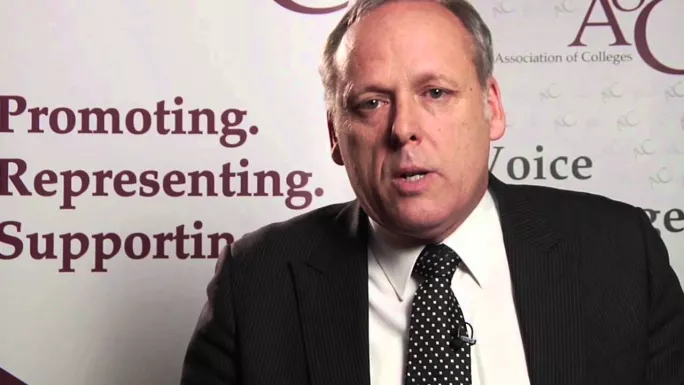‘The next twelve months will be critical for the future of colleges’
Martin Doel, chief executive of the Association of Colleges, writes:
We live in interesting times and they are about to get even more interesting, worrying or exciting, depending upon your character, outlook and attitude. The next five months up to the general election will be critical for colleges, their students and the FE system as a whole; so too will the following six months when the incoming government, of whatever hue or form, puts together its programme.
The consensus across all political commentators seems to be that it’s too close to call as to who will have the largest share of the votes in the election. A simple majority government seems unlikely, or even a “simple coalition” of two parties. All this would seem to premise a good deal of uncertainty for colleges and FE more generally, and that’s true to an extent. There are, though, some relative certainties, regardless of who forms the next government.
The first is money - there isn’t going to be much of it about. The Labour Party may seek to reduce the deficit more slowly and the Liberal Democrats might seek to vary the tax-and-spend mix, but austerity in public spending isn’t going away anytime soon. Moreover, as the demographic bulge in primary school numbers makes its way through to the secondary phase - which is significantly more expensive - we could well see a “black hole” developing in the Department for Education budget, whether it is or isn’t inside a ring-fence.
But this black hole cannot and must not be filled in through further plundering of funding for 16 to 18-year-olds. Each 16 to 18-year-old receives an average of 22 per cent less than 5 to 16-year-olds in England; this is 37.5 per cent if they are unfortunate enough to need to stay until age 19 to complete their studies. This differential has been accentuated by recent changes in the school funding formula. The alternative to buying out the black hole with 16-18 money is to sit down and complete a once in a generation review of what money is available and what we can afford at each stage of education in a coherent and systematic way. If we don’t, we risk having a completely imbalanced system where investment in early years is wasted by a failure to complete the job. Interestingly, independent schools increase fees in the sixth form just as the state sector disinvests in this stage, which must risk further entrenching social advantage.
It’s even more remarkable that colleges and providers have kept alive a functioning adult education system in the face of a new 30 per cent cut in funding for all but apprenticeships, with the prospect of a further 16 per cent cut in the year ahead. This brings me indirectly to my second point of commonality which is English devolution.
Whatever the outcome of the election, the devolution bus has left the station and with each of the successive city deals that we have seen over the last couple of months, control of the “skills budget” has been thrown into the mix. This assumes that there is an easily identifiable and presumably burgeoning skills budget. But if this refers to the budget beyond apprenticeships, then I think Local Enterprise Partnerships (LEPs), combined authorities or any other local agency seeking to get their hands on this budget could end up saying “is that all there is?”
I have omitted apprenticeship budgets here since it seems to me difficult to devolve something twice in different directions. All of the parties are talking about ways in which control of apprenticeship funding will be devolved to employers, many of which have national footprints; it might be tricky, at the same time to give it to combined authorities and/or LEPs. There is also the small issue of funding the “arms race” in apprenticeship numbers to achieve over three million starts on high-quality apprenticeships by 2020, something that will be much harder to control both quantitatively and qualitatively on a devolved basis.
If all of this sounds more than a mite depressing, there is a light at the end of the tunnel and this is in the analysis of a problem and its most obvious solution. There is emerging consensus that one of the fundamental building blocks of a sustainable recovery is a more skilled workforce, particularly at the technician level short of full degree level but beyond basic skills.
This is the core territory of colleges. Success at this level depends on three things: expert teachers who are also expert in the professions and trades their students are seeking to enter, industry-standard facilities, and a close, continuous relationship with employers of all sizes at the local, regional and national levels. Further education colleges each work with an average of 600 employers, their staff impart cutting edge practice to students, as well as cutting edge knowledge, and despite hiccups along the way their estate and facilities provide what Frank McLoughlin’s report commission on adult vocational teaching called a clear ‘line of sight to work.’ The evidence shows that along the way colleges generate a return to the £2.90 for every £1 invested.
What is flowing from this analysis is that, far from being in any sense a problem, colleges are the solution to the need to generate a recovery that is sustainable and the benefits of which are widely shared. They are already doing this despite a creaking system within which they work and under-investment relative to some other sectors. The challenge in the year ahead is to give them the tools to continue to succeed through policy and resources, rather than in spite of them.
Keep reading for just £1 per month
You've reached your limit of free articles this month. Subscribe for £1 per month for three months and get:
- Unlimited access to all Tes magazine content
- Exclusive subscriber-only stories
- Award-winning email newsletters




